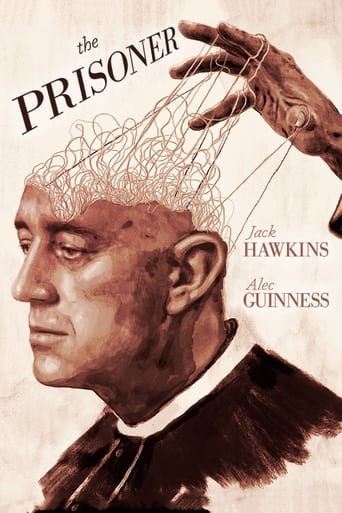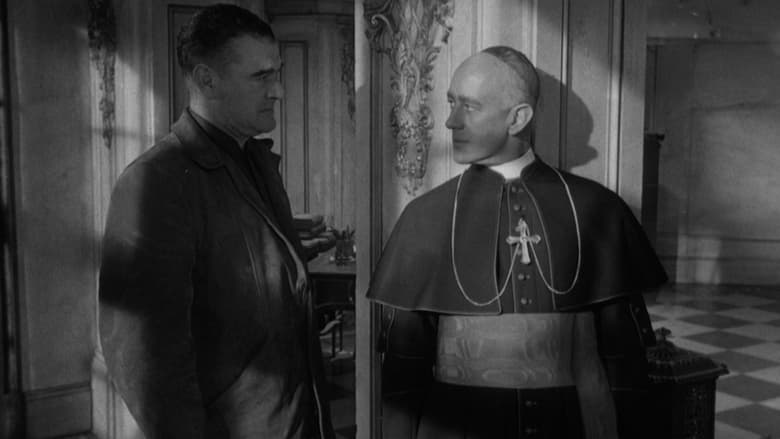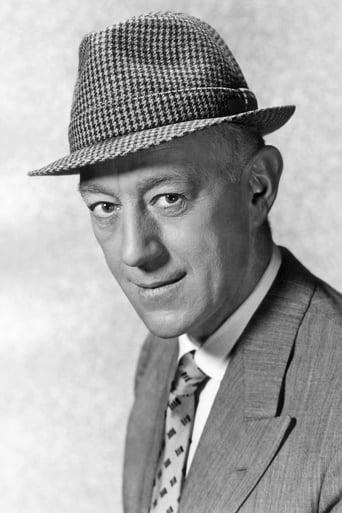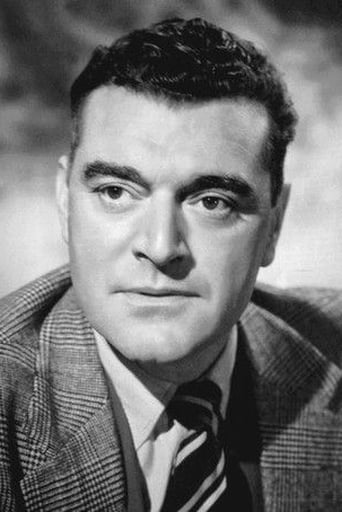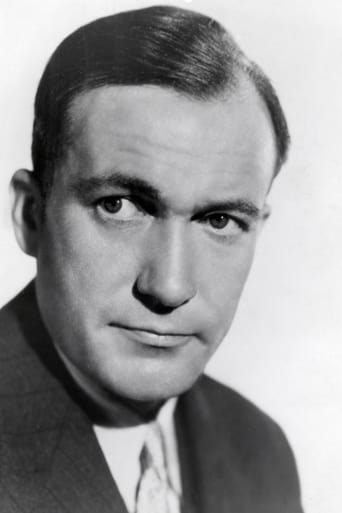The Prisoner (1955)
A cardinal is arrested for treason against the state. He is a popular hero of his people, for his resistance against the Nazis during the war and his resistance when his country again fell to a totalitarian conqueror. In prison, his interrogator is determined to extract a confession of guilt, and thus destroy his power over his people.
Watch Trailer
Cast


Reviews
"The Prisoner" is a tour de force between two superlative actors Alec Guinness and Jack Hawkins. It's an unusual sort of movie in that it is set in an unnamed communist country following WWII and all of the characters do not have names.A Cardinal (Alec Guinness) is arrested for treason against the government. He had been a hero of the resistance against the Germans in WWII and now is accused of rallying the people against the new totalitarian regime. He is to be question by master interrogator Jack Hawkins.Over a period of three months the interrogator tries to break the priest's resolve and force him to sign a bogus confession of his guilt. He uses sleep deprevation, relentless badgering, bright lights and even bringing the Cardinal' s mother into play. But the Cardinal is the interrogator's equal in intelligence.Eventually the Cardinal's own self doubts are brought to the forefront and he is broken and put on trial. He is found guilty and is sentenced to death but..................................................................................................................The ending of the movie is particularly poignant leaving the question: Did anyone really win this verbal battle of the minds?Although this is essentially a two actor performance, there are some interesting supporting players as well. Wilfred Lawson plays the somewhat likeable jailer, Kenneth Griffith is Hawkins ambitious secretary, Jeanette Stark and Ronald Lewis play a young couple trying to make sense of it all and Raymond Huntley is the General.The story was supposedly based on the Cardinal Mindszenty trial in Hungary in 1948.
because it is a great artistic duel between Alec Guiness and Jack Hawkins, remembering, in few scenes, "Beckett". because the performance of Wilfrid Lawson is really seductive. because it use as symbol, maybe, the example of Jozsef Mindszenty, Archibishop of Esztergom, but, in same measure , it is an inspired story about the conflict between the State and the Church under Communism. it represents one of of films with a precise target. almost a refuge. because it is slow, uncomfortable, simple and far to give answers. one of films who must see it. because it is a large window to the essential things defining each of us.
Interesting play by Bridget Boland loosely based on the notorious fake trial of Cardinal Mindszenty of Hungary after a month of brainwashing by the communists in 1948. Alec Guinness was himself a catholic and is really living out his catholicism in this great performance of the live dissection of a catholic priest, extremely actual in today's situation with the church immersed in scandals of pedophilia. Bridget Boland makes a very different story from the Mindszenty drama, making the interrogator (Jack Hawkins) an equal to the Cardinal as opponent and prosecutor and seems to be winning but actually loses in the end against the honesty of the Cardinal realizing his own futility, while the prosecutor- interrogator as a victor is the real loser and takes the consequences. Fascinating drama, which should be returned to again and again. In reality, Cardinal Mindszenty's brainwash process only lasted for less than a month and was chiefly conducted by the use of drugs and physical exhaustion. The only parallel torture that Alec Guinness is exposed to is forced insomnia. He is imprisoned for longer than three months with only private talks with the interrogator as a method and finally released, when the "state" thinks it has won by ruining his reputation and exposing him as a fraud, while Cardinal Mindszenty was sentenced for life. The film was made in 1955, the year after saw the Hungarian revolt, and Cardinal Mindszenty was then set free and lived a long life, even writing books and his memoirs. He is still one of the most important icons of Hungary and will remain so. His shrine is at the ancient basilica of Esztergom north of Budapest, a very beautiful place by the Danube.
This is one of those puzzling films to try and analyze as it gives you no character to which to be loyal to. It all starts off promisingly as a well-loved Bishop (Alec Guennis) is suddenly arrested and put into confinement to be questioned as an enemy of the state. When that tragic priest is played by the effervescent Guennis, you know that the characterization will be brilliant, and sure enough, it is. Jack Hawkins as the investigator brutally questioning him starts off gently, but gradually, it builds to horrific methods in order to reach his goal. There are lots of angry conversations of human failings-towards flesh, hatred of fellow man, and even resentments to God. In lesser acting hands, I would call this a total bore, but Guennis could make villains likable ("Oliver Twist's" Fagin) and be both touching ("Star Wars") and even dreadfully funny ("Murder By Death"). Even as Hitler, Guennis added much humanity to the greatest villain civilization has ever known. But this is a difficult assignment, more an acting exercise rather than a full-fledged story, and ultimately emotionally D.O.A., just like the poor Bishop's life is as he faces man's greatest and most evil goal: mind control.

